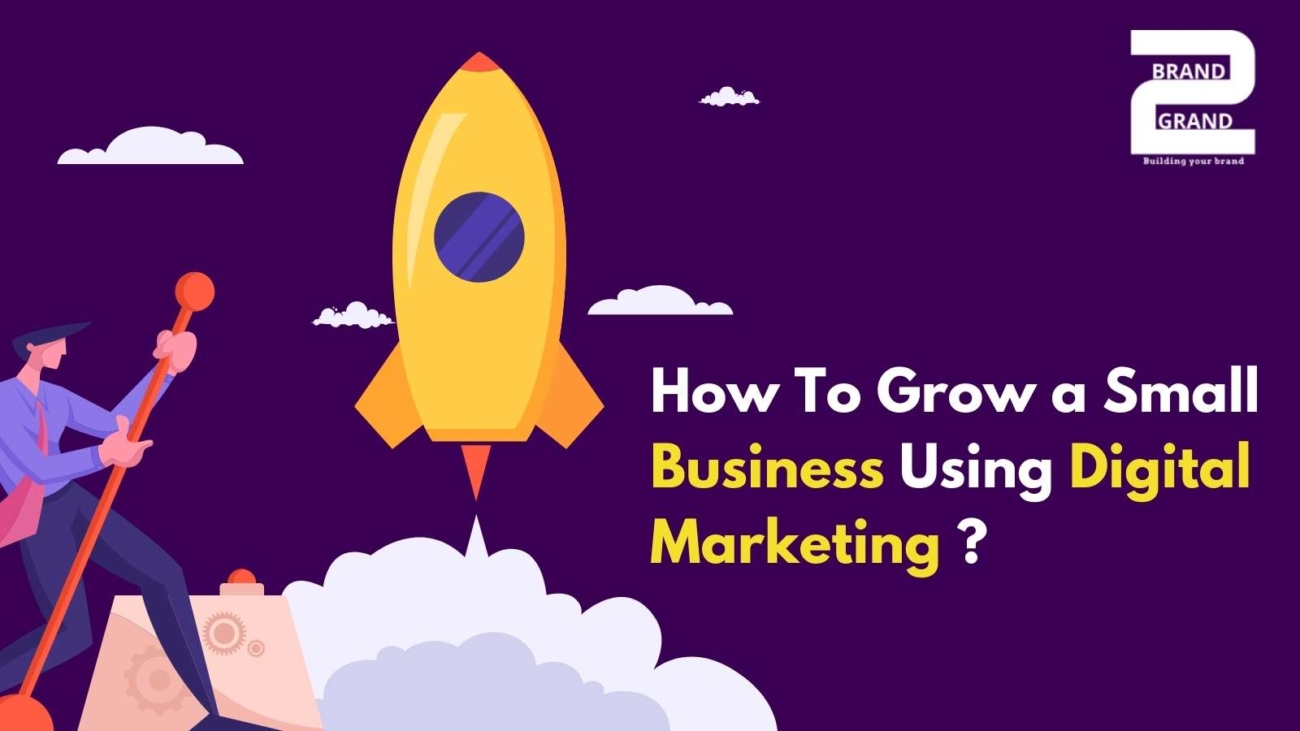Growing a small business using digital marketing involves leveraging online channels and strategies to reach a broader audience, increase brand awareness, and drive customer engagement. Here’s a comprehensive guide on how to grow a small business using digital marketing:
1. Build a Strong Online Presence:-
– Website Optimization: Ensure your website is user-friendly, mobile-responsive, and optimized for search engines (SEO).
– Google My Business: Claim and optimize your Google My Business listing for local visibility.
2. Define Your Target Audience:-
– Identify your ideal customers and create buyer personas to tailor your marketing efforts accordingly.
3. Content Marketing:-
– Create valuable and relevant content to showcase your expertise and attract your target audience.
– Blogging, videos, infographics, and ebooks can all contribute to a robust content marketing strategy.
4. Social Media Marketing:-
– Choose social media platforms where your audience is active.
– Develop a content calendar and share a mix of promotional and engaging content.
– Utilize paid advertising on platforms like Facebook and Instagram.
5. Email Marketing:-
– Build and segment your email list for targeted communication.
– Implement personalized and automated email campaigns.
– Offer exclusive promotions and incentives to subscribers.
6. Search Engine Optimization (SEO):-
– Optimize your website for relevant keywords to improve search engine rankings.
– Create quality backlinks and regularly update your content.
7. Paid Advertising:-
– Use Google Ads for targeted search engine advertising.
– Consider social media advertising on platforms like Facebook, Instagram, and LinkedIn.
8. Leverage Local SEO:-
– Ensure accurate business information across online directories.
– Encourage customer reviews and respond promptly to feedback.
9. Mobile Optimization:-
– Optimize your website and content for mobile users.
– Consider mobile advertising options for reaching a broader audience.
10. Influencer Marketing:-
– Collaborate with local influencers or micro-influencers in your industry.
– Leverage influencer partnerships for product/service promotions.
11. Analytics and Data Tracking:-
– Use analytics tools to track website traffic, user behavior, and marketing campaign performance.
– Analyze data to make informed decisions and optimize your strategies.
12. Customer Engagement:-
– Actively engage with your audience on social media and respond to comments and messages.
– Encourage user-generated content and customer testimonials.
13. E-commerce Integration (if applicable):-
– If your business involves selling products, consider setting up an online store.
– Optimize the checkout process and offer secure payment options.
14. Partnerships and Collaborations:-
– Explore partnerships with other local businesses for cross-promotions.
– Collaborate with influencers or industry experts for joint initiatives.
15. Customer Retention Programs:-
– Implement loyalty programs and offer exclusive deals to repeat customers.
– Regularly communicate with existing customers through newsletters and updates.
16. Stay Updated and Adapt:-
– Stay informed about industry trends and emerging digital marketing strategies.
– Continuously adapt your approach based on performance metrics and changing market dynamics.
Remember that consistency is key in digital marketing. Regularly monitor your efforts, analyze data, and make adjustments to optimize your strategy over time. Digital marketing is an ongoing process that requires adaptation and refinement based on your business goals and the evolving digital landscape.
How to Grow Your Small Business With Digital Marketing
In today’s digital age, it’s essential for businesses to have a strong online presence in order to stay competitive. Digital marketing provides a variety of tools and strategies to help businesses grow and reach their target audience.
Here are some tips on how to grow your business using digital marketing:
Create a Strong Website: A well-designed and user-friendly website is essential for any business. It’s important to ensure your website is optimized for search engines, mobile-friendly, and provides a seamless user experience.
Develop a Content Marketing Strategy: Content marketing involves creating and sharing valuable content to attract and engage with your target audience. Develop a content marketing strategy that focuses on creating high-quality content that is optimized for search engines and shareable on social media.
Use Social Media: Social media platforms provide a powerful tool for businesses to connect with their target audience. Determine which social media platforms your audience uses the most and develop a social media strategy that includes regular posts, engagement with followers, and paid advertising.
Invest in SEO: Search engine optimization (SEO) involves optimizing your website and content to improve your search engine rankings. Invest in SEO to ensure your business appears at the top of search engine results pages for relevant keywords.
Use Email Marketing: Email marketing is an effective way to nurture relationships with your customers and keep them engaged with your business. Develop a targeted email marketing campaign that provides value to your customers and encourages them to take action.
Analyze Your Results: Finally, it’s important to regularly analyze your digital marketing efforts to determine what’s working and what’s not. Use analytics tools to track your website traffic, social media engagement, and email campaign performance, and adjust your strategies accordingly.
In conclusion, digital marketing provides a variety of tools and strategies to help businesses grow and reach their target audience. By creating a strong website, developing a content marketing strategy, using social media, investing in SEO, using email marketing, and analyzing your results, you can effectively grow your business in the digital age.


